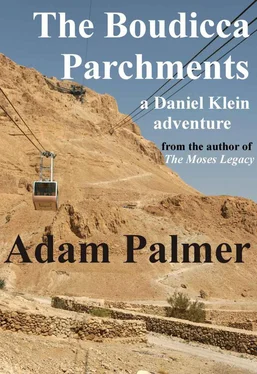Adam Palmer - The Boudicca Parchments
Здесь есть возможность читать онлайн «Adam Palmer - The Boudicca Parchments» весь текст электронной книги совершенно бесплатно (целиком полную версию без сокращений). В некоторых случаях можно слушать аудио, скачать через торрент в формате fb2 и присутствует краткое содержание. Жанр: Прочие приключения, на английском языке. Описание произведения, (предисловие) а так же отзывы посетителей доступны на портале библиотеки ЛибКат.
- Название:The Boudicca Parchments
- Автор:
- Жанр:
- Год:неизвестен
- ISBN:нет данных
- Рейтинг книги:3 / 5. Голосов: 1
-
Избранное:Добавить в избранное
- Отзывы:
-
Ваша оценка:
- 60
- 1
- 2
- 3
- 4
- 5
The Boudicca Parchments: краткое содержание, описание и аннотация
Предлагаем к чтению аннотацию, описание, краткое содержание или предисловие (зависит от того, что написал сам автор книги «The Boudicca Parchments»). Если вы не нашли необходимую информацию о книге — напишите в комментариях, мы постараемся отыскать её.
The Boudicca Parchments — читать онлайн бесплатно полную книгу (весь текст) целиком
Ниже представлен текст книги, разбитый по страницам. Система сохранения места последней прочитанной страницы, позволяет с удобством читать онлайн бесплатно книгу «The Boudicca Parchments», без необходимости каждый раз заново искать на чём Вы остановились. Поставьте закладку, и сможете в любой момент перейти на страницу, на которой закончили чтение.
Интервал:
Закладка:
Tikva was not a worldly man, having only rarely set foot outside of Israel and then usually only to Jewish areas of major metropolises like London’s Stamford Hill. But the townhouse in Belgravia lived up to his expectations. He had once seen an episode of a British television series set against the background of the British aristocracy in Edwardian times and this place reminded him of that.
After a five minute wait in an anteroom, Tikva was led into a rosewood-panelled drawing room where he found himself facing an elegant lady in her sixties, remarkably attractive for her age. He remembered that she had once been a model in TV adverts. She was dressed in an beige evening dress, but he was relieved that it was suitably modest.
“Good evening,” she said in the most upper class English accent he had ever heard. “I am Lady Lefou. But you may call me Chienmer.”
He looked at her blankly.
“My first name.”
She held out her hand. But he hesitated. As an orthodox Jewish man he was not supposed to shake hands with a woman. But it would seem impolite if he spurned the hand of his hostess. It would feed all the prejudices against the Jews that this woman was known for. On the other hand she would surely understand. She had criticized western women — or at least the younger ones — for the immodesty of their dress. And she had praised the Muslims for their standards of modesty, in contrast.
“A pleasure to meet you,” he replied, keeping his hands by his sides but bowing from the waist, like an old-fashioned English gentleman.
Bowing from the waist was acceptable, he told himself, as long as he didn’t bend the knee.
Orthodox Jews only bend the knee before God.
Lefou lowered her hand, as if realizing Baruch Tikva’s dilemma.
“Well sit down.”
She pointed to an armchair that bore an embroidered design of pink and purple on a fabric of pale gold. He sat, but realized afterwards that he had committed a faux pas and should have waited for her to sit first. She smiled at his obvious embarrassment, as she took her seat opposite him.
“First of all,” she said, “I want you to know that I don’t see you as tainted by the same brush as the Zionists.”
He remembered that although she had positioned herself as anti-Zionist and not anti-Semitic, she had also declared herself to be against Judaism, as a religion, claiming that it was “dishonest, inhumane, supremacist, hate-fuelled, predatory, treacherous and does not deserve to be called a religion at all.” She claimed, however, that she was not hostile to people of Jewish descent per se. But that did not prevent her from accusing them of being part of a conspiracy with the Freemasons, from whom, she asserted, they were indistinguishable. A self-styled “atheist”, she also professed to be an admirer of Iranian Shi’ite Islam, which she claimed was similar to Hellenism!
However, although Shomrei Ha’ir believed, like other orthodox Jews, in the same Talmud that Lefou had lambasted, she had already made it clear, in their online communications, that she was ready to make an exception for them in the name of expediency. He nodded his acceptance of her “graciousness”, thinking that now was not the time to look a gift horse in the mouth.
“So Mr Tikva, I understand you want me to use my contacts to make certain arrangements for you.”
He coughed nervously and spoke in an uncharacteristically awkward tone.
“Yes. Both personnel and equipment.”
“Specifically?”
“I need a driver — a good one. Also a couple of men with guns who know how to use them.”
Chienmer Lefou didn’t flinch.
“That’s it?”
“Oh and one other thing. Three L-109 hand grenades.”
Chapter 25
“Your Honour, my client is a respected academic with no criminal record whatsoever. He has a tenured teaching post at University College London. He has published numerous scholarly papers in prestigious academic journals. He has participated in conferences around the world. He has but one residential address, in London and is a UK resident for tax purposes and has been on the electoral roll in the United Kingdom since his eighteenth birthday without abatement. He is a man of unblemished record and of good character, as attested by these affidavits from various colleagues both in the UK and abroad — which m’learned friend has accepted uncontested. For these reasons I would ask that he be released on bail and that bail be set at a reasonable amount.”
Because the charge was murder, the bail application had to go through a Circuit judge in the Crown Court, as a magistrates’ court lacked the authority to release on bail a person charged with murder. The judge, a tall man in his sixties, sat impassively through Peter Hackett’s brief presentation. Hackett was responding to the prosecutor’s initial submission that where the charge was murder, bail could not be granted unless the Court was satisfied that the accused would not harm anyone else while on bail. Hackett had responded by dismissing the suggestion that Daniel would harm anyone as absurd and then went on to argue for bail, instead of letting the prosecutor lead off with additional arguments against bail.
This was an unusual approach — as there was always a legal presumption in favour of bail — but it was not unheard of. The judge inclined his head towards the prosecutor.
“Mr Richmond.”
Hackett sat down and Anthony Richmond for the prosecution rose from his seat.
“Briefly, Your Honour, the Crown opposes bail and asks that the accused be remanded in custody until the Committal Hearing. Whilst it is true that he has no previous criminal record — nor indeed Cautions, Reprimands or Warnings — it is a matter of undisputed record that on a previous occasion he left the jurisdiction of the Court and went abroad using a foreign passport while on bail for another murder .”
Hackett stirred, as if poised to respond. But Richmond pre-empted him.
“Now the Crown concedes that Professor Klein was wholly innocent of that murder and indeed further freely concedes — without being prompted — that he was instrumental in identifying and physically apprehending the real killer in Israel where said killer was subsequently convicted of serious offences involving terrorism. The Crown also concedes that although Professor Klein left the jurisdiction of the court without authorization, and breached other bail conditions, he did finally answer to his bail upon his return to the United Kingdom, whereupon the Crown took the view that it was not in the public interest to prosecute him for his breach of bail conditions.
“However, the fact that Professor Klein was ready and able to breach his bail in such a brazen manner — going so far as to flee the country — means that there is a significant risk that he may do so again in this case. Furthermore, Professor Klein has a substantial — one may even call it a vast — network of contacts abroad as a result of the international nature of his work. The Crown concedes that he is resident in the United Kingdom and that he holds a tenured position here at a prestigious university and that his sole residence — as far as we know — is located within the jurisdiction of this Court. But he has relatives and contacts in the United States and Israel and could easily escape the jurisdiction of this Court, should he be minded to do so. That, in conjunction with the fact that he has done so on a previous occasion, renders him — in the submission of the Crown — ineligible for bail.”
Richmond sat down and Hackett rose again, not waiting for the judge to call on him to do so.
“Your Honour should know that if this is the main source of the Court’s concern, then Professor Klein is willing to surrender his passports to the Court. Indeed I have it here in my possession now for immediate surrender, should this satisfy Your Honour.”
Читать дальшеИнтервал:
Закладка:
Похожие книги на «The Boudicca Parchments»
Представляем Вашему вниманию похожие книги на «The Boudicca Parchments» списком для выбора. Мы отобрали схожую по названию и смыслу литературу в надежде предоставить читателям больше вариантов отыскать новые, интересные, ещё непрочитанные произведения.
Обсуждение, отзывы о книге «The Boudicca Parchments» и просто собственные мнения читателей. Оставьте ваши комментарии, напишите, что Вы думаете о произведении, его смысле или главных героях. Укажите что конкретно понравилось, а что нет, и почему Вы так считаете.












